The AMD Ryzen Threadripper 3960X and 3970X Review: 24 and 32 Cores on 7nm
by Dr. Ian Cutress, Andrei Frumusanu & Gavin Bonshor on November 25, 2019 9:05 AM ESTCPU Performance: Web and Legacy Tests
While more the focus of low-end and small form factor systems, web-based benchmarks are notoriously difficult to standardize. Modern web browsers are frequently updated, with no recourse to disable those updates, and as such there is difficulty in keeping a common platform. The fast paced nature of browser development means that version numbers (and performance) can change from week to week. Despite this, web tests are often a good measure of user experience: a lot of what most office work is today revolves around web applications, particularly email and office apps, but also interfaces and development environments. Our web tests include some of the industry standard tests, as well as a few popular but older tests.
We have also included our legacy benchmarks in this section, representing a stack of older code for popular benchmarks.
All of our benchmark results can also be found in our benchmark engine, Bench.
Speedometer 2: JavaScript Frameworks
Our newest web test is Speedometer 2, which is a accrued test over a series of javascript frameworks to do three simple things: built a list, enable each item in the list, and remove the list. All the frameworks implement the same visual cues, but obviously apply them from different coding angles.
Our test goes through the list of frameworks, and produces a final score indicative of ‘rpm’, one of the benchmarks internal metrics. We report this final score.
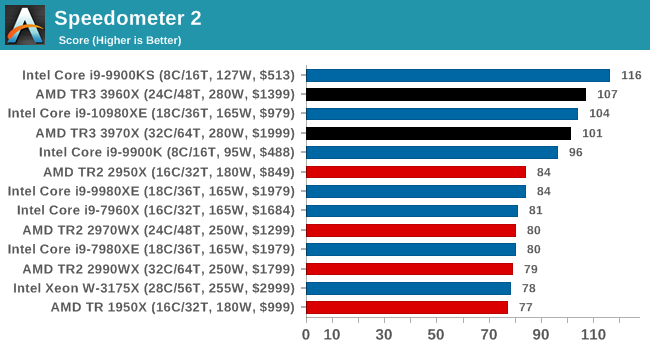
Google Octane 2.0: Core Web Compute
A popular web test for several years, but now no longer being updated, is Octane, developed by Google. Version 2.0 of the test performs the best part of two-dozen compute related tasks, such as regular expressions, cryptography, ray tracing, emulation, and Navier-Stokes physics calculations.
The test gives each sub-test a score and produces a geometric mean of the set as a final result. We run the full benchmark four times, and average the final results.
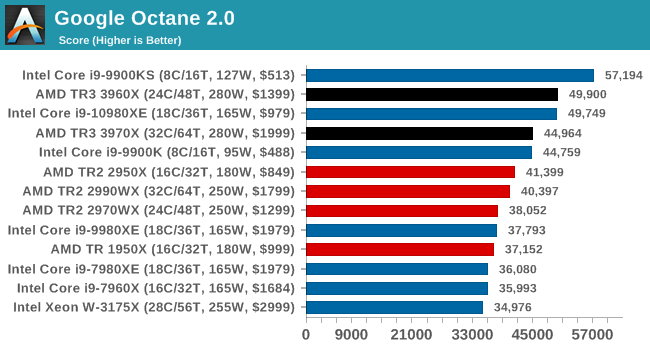
Mozilla Kraken 1.1: Core Web Compute
Even older than Octane is Kraken, this time developed by Mozilla. This is an older test that does similar computational mechanics, such as audio processing or image filtering. Kraken seems to produce a highly variable result depending on the browser version, as it is a test that is keenly optimized for.
The main benchmark runs through each of the sub-tests ten times and produces an average time to completion for each loop, given in milliseconds. We run the full benchmark four times and take an average of the time taken.
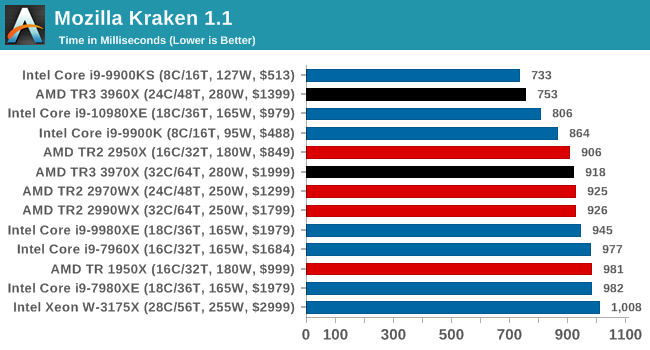
3DPM v1: Naïve Code Variant of 3DPM v2.1
The first legacy test in the suite is the first version of our 3DPM benchmark. This is the ultimate naïve version of the code, as if it was written by scientist with no knowledge of how computer hardware, compilers, or optimization works (which in fact, it was at the start). This represents a large body of scientific simulation out in the wild, where getting the answer is more important than it being fast (getting a result in 4 days is acceptable if it’s correct, rather than sending someone away for a year to learn to code and getting the result in 5 minutes).
In this version, the only real optimization was in the compiler flags (-O2, -fp:fast), compiling it in release mode, and enabling OpenMP in the main compute loops. The loops were not configured for function size, and one of the key slowdowns is false sharing in the cache. It also has long dependency chains based on the random number generation, which leads to relatively poor performance on specific compute microarchitectures.
3DPM v1 can be downloaded with our 3DPM v2 code here: 3DPMv2.1.rar (13.0 MB)
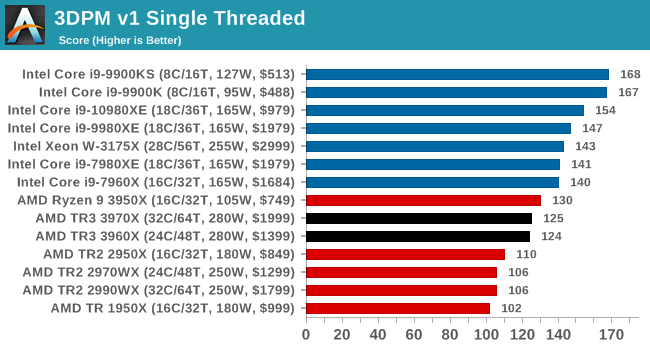
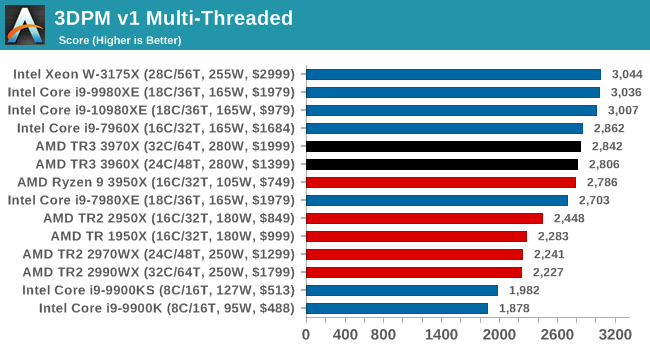
x264 HD 3.0: Older Transcode Test
This transcoding test is super old, and was used by Anand back in the day of Pentium 4 and Athlon II processors. Here a standardized 720p video is transcoded with a two-pass conversion, with the benchmark showing the frames-per-second of each pass. This benchmark is single-threaded, and between some micro-architectures we seem to actually hit an instructions-per-clock wall.
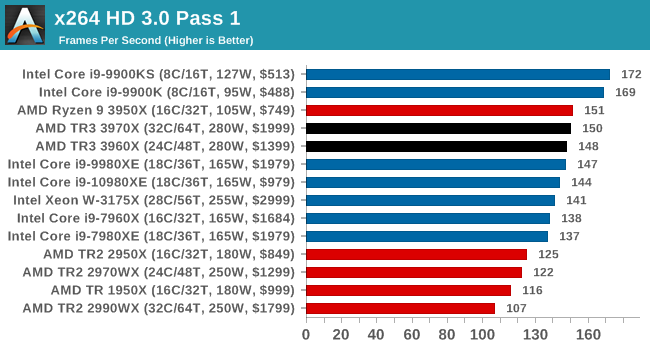
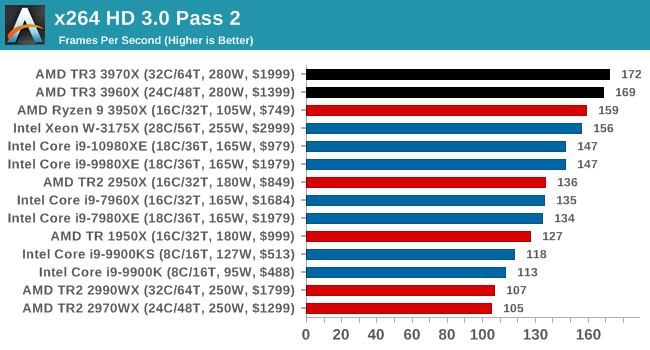
GeekBench4: Synthetics
A common tool for cross-platform testing between mobile, PC, and Mac, GeekBench 4 is an ultimate exercise in synthetic testing across a range of algorithms looking for peak throughput. Tests include encryption, compression, fast Fourier transform, memory operations, n-body physics, matrix operations, histogram manipulation, and HTML parsing.
I’m including this test due to popular demand, although the results do come across as overly synthetic, and a lot of users often put a lot of weight behind the test due to the fact that it is compiled across different platforms (although with different compilers).
We record the main subtest scores (Crypto, Integer, Floating Point, Memory) in our benchmark database, but for the review we post the overall single and multi-threaded results.
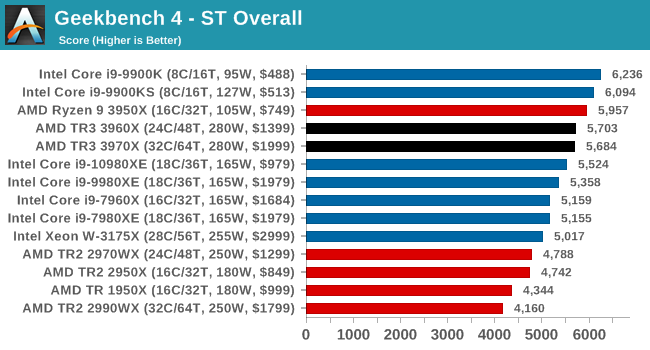
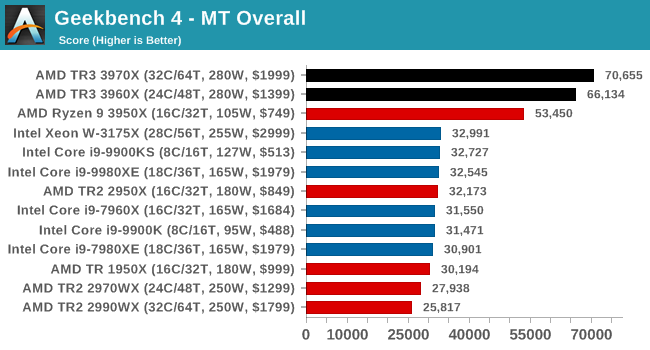










245 Comments
View All Comments
MarkusB. - Tuesday, November 26, 2019 - link
I dont think and I dont hope that Intel is dead here. I do love the current status to be honest. Let them fight on the same level. I dont care if I use a AMD or an Intel chip at the end of the day. Let the CPUs get cheaper and more powerfull with a nice and working competition :) ... Intel will react on this and maybe in a few years Intel is back, just to be chased again by AMD. THAT´s how it should be ;)azfacea - Tuesday, November 26, 2019 - link
intel won in 2005 because GloFo (part of amd then) couldnt keep up. now its reverse with TSMC. intel is dead for goodZizo007 - Tuesday, November 26, 2019 - link
My last Intel was the 4770K which was a great CPU. Nowdays AMD is dominating CPU performance and I am very happy with my 4Ghz 1800X. I saw no reason to upgrade the 4770K until Ryzen has launched. Intel will catch up but this might take a year or two. Intel won't be out of business for sure and that would be bad for us since AMD will raise their prices if there is no competition. In the other hand Intel is entering the GPU market which will help them. AMD is currently suffering in the GPU market as they only have the 5700XT which cannot keep up with the RTX series and Big Navi needs a miracle to even match the old Turing architecture; Big Navy won't even be released this year.Dr. Denis - Tuesday, November 26, 2019 - link
It would be nice if AMD released an entry level TR3 with 16 cores at the $900-$1000 price point. It would be like a 3950x but with the extra memory bandwidth and pcie lanes, which are really important in a variety of workloads. I think the reason why this configuration doesn't exist yet is because AMD has "Ryzen" the HEDT bar to high making the market for it too small. What do you think?azfacea - Tuesday, November 26, 2019 - link
pointless product. if you are building a 3000 usd workstation you can afford 1400. if you just want pcie lanes, there are some older gen thread rippers out there for 200 usd. AMD should focus on rolling out 2 -- and not 1 -- 7nm APU dies. one quad core for 15w and below and a 8 core apu for 15 inch laptops and larger, 25W+Dr. Denis - Tuesday, November 26, 2019 - link
Well... The APU market is another story since its the only place where AMD is still behind Intel in efficiency, and consequently, in performance. We all expect zen2 will revert this in 2020.Back to the workstation side, it seems now that the best option for a ~16 core system for memory bound applications is the good old Skylake
CyrIng - Tuesday, November 26, 2019 - link
Thank you AnandTech for this review.Talking about HEDT processing, why don't include Linux benchmark results ? Do games scores make a difference for a super computer...
Samus - Wednesday, November 27, 2019 - link
I need this to decompress my torrents. I'm tired of waiting 10 seconds for a bluray to extract and would rather wait 4 seconds...it's movie time!335 GT - Wednesday, November 27, 2019 - link
AMD's biggest problem now is making enough of these. Every EPYC is sold before it leaves the fab and I suspect the same is happening with the desktop chips.ballsystemlord - Wednesday, November 27, 2019 - link
No spelling or grammar errors found! Nice work, guys!